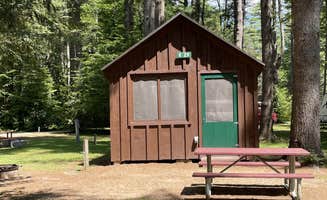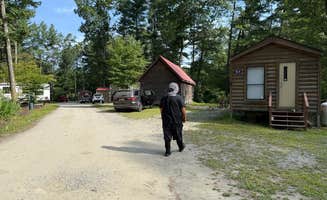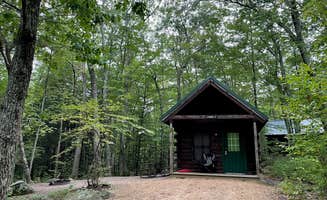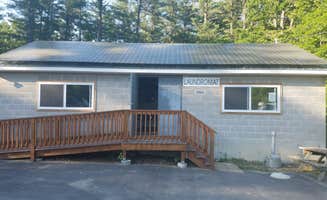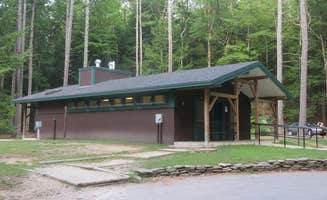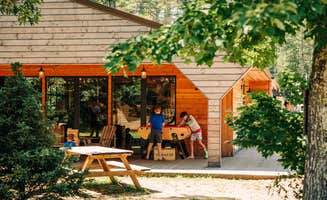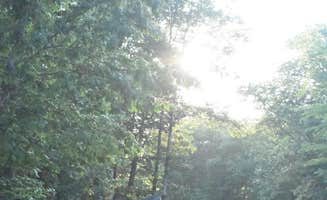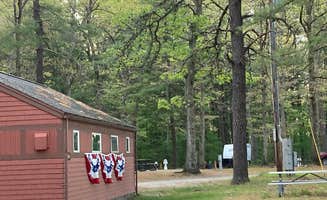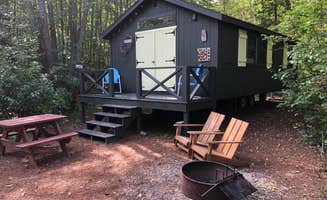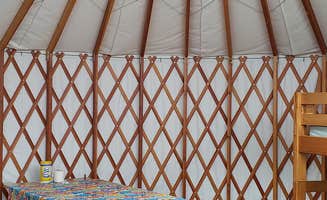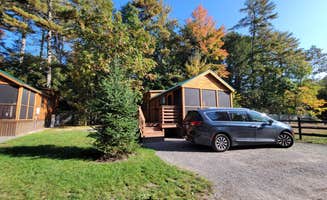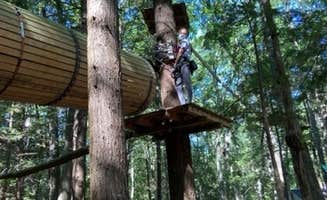Camping near Hampton Beach, New Hampshire offers diverse options for outdoor enthusiasts within a 20-mile radius of the Atlantic shore. The area features coastal salt marshes transitioning to inland pine forests with elevation rising gradually from sea level to about 250 feet. Summer temperatures typically range from 60-85°F with coastal humidity and occasional fog, while spring and fall camping seasons can experience temperature swings of 30+ degrees between day and night.
What to do
Kayaking on Pawtuckaway Lake: At Pawtuckaway State Park Campground, visitors can enjoy paddling on the lake with several water access points. "This a a fantastic little camp for if you want to go canoeing or kayaking or boating of any kind! It's set up of three islands and a large majority of the campsites are right on the water," notes one camper.
Beach day at Cape Ann: Located 40 minutes from Hampton Beach, Cape Ann Camp Site offers a convenient base for ocean swimming. "Cape Ann Campground is located close to Gloucester and Rockport. The campground is clean and quiet with beautiful tent sites," reports a visitor who appreciated the coastal access.
Mountain biking trails: Bear Brook State Park provides extensive mountain biking networks through forested terrain. "We camped here to check out the mountain bike trails in the park and we're not disappointed on either count. The biking trails were a blast," shares an enthusiastic rider who enjoyed the technical sections and well-maintained pathways.
What campers like
Private waterfront sites: Many campers prefer lakeside accommodations for the views and easy water access. "We stayed in sites 110 and our friends stayed in 109 on Big Island. Those were wonderful sites, level with great views of the lake and are situated right across from the bath/shower," notes a Bear Brook State Park Campground visitor.
Clean facilities: Campground cleanliness ranks high among visitor priorities. "The washer/dryer setup is immaculate with brand new equipment. Small washer $3.25, big washer $4.25, dryers $2 for 45 minutes," reports a camper at Sea Coast Camping and RV Resort, highlighting the well-maintained infrastructure.
Wildlife viewing opportunities: The region's natural areas support diverse wildlife. "Walking around we saw wild turkeys, bunnies, and a hummingbird," shares a Wakeda camper, while another adds, "The next day I realized that they [ducks] would never leave so we became less generous. Eventually, they realized we were on to them."
What you should know
Shower facilities vary widely: Prepare for different shower setups across campgrounds. "Showers require payment with quarters. I don't know how many quarters it takes because I don't carry change. So I washed my hair in the sink," explains a Winter Island Park visitor, while others note pay showers at multiple campgrounds ranging from $0.25 to $0.50.
Seasonal restrictions: Some parks limit dog access during peak periods. "Tried to plan ahead this year and get a prime site to learn they don't allow dogs anywhere in the campground during summer months," notes a Pawtuckaway visitor, highlighting pet restrictions from Memorial Day through Labor Day.
Cell service varies: Connectivity differs significantly between campgrounds. "Forget about cellphone signal, it was 0," reports a Tuxbury Pond camper, while others note spotty service with 1-2 bars depending on carrier, with Verizon typically performing better than AT&T in forested areas.
Tips for camping with families
Book beach proximity sites early: Waterfront camping spots fill quickly, especially for yurt camping near Hampton Beach, New Hampshire. "The sites on the water book up quickly but they're perfect for fishing and boating. Also, the view!" advises a Pawtuckaway visitor who recommends reserving 6+ months in advance for summer weekends.
Playground options: When selecting a campground with younger children, consider play facilities. "The pool, playground, bathrooms, and basketball court were all open and well maintained. We really enjoyed our stay!" shares a Tuxbury Pond RV Campground visitor who appreciated the structured recreational options.
Plan for insects: Coastal salt marshes near Hampton Beach can produce heavy mosquito activity. "The con of this camp ground was the misquote, we went through 3 deep woods cans in just the first night. They were crazy and kids were eaten alive," warns a Pines Camping Area visitor who recommends mesh screens and repellent with 30%+ DEET.
Tips from RVers
Site selection matters: RV site quality and size vary significantly between campgrounds. "Most sites are grass, ours was mostly dirt due to trees overhead. We were tucked in between seasonal campers, who are all kind and compassionate humans," reports a Dixons Coastal Maine Campground visitor.
Challenging access at some parks: Be prepared for tight turns and narrow roads. "Tight little roads and spots," notes a Dixon's camper, while another mentions, "The roads in the park are fairly narrow and we had to drive over the grass across from our site in order to back in." This is particularly important for rigs over 30 feet seeking Hampton Beach area yurt camping alternatives.
Hookup reliability: Power stability differs between campgrounds. "Our site (#124) was one of the new sites which they had just completed. It was a gravel back-in which was plenty long and level," shares a Sea Coast visitor who appreciated the reliable electrical service without voltage fluctuations during peak usage periods.


